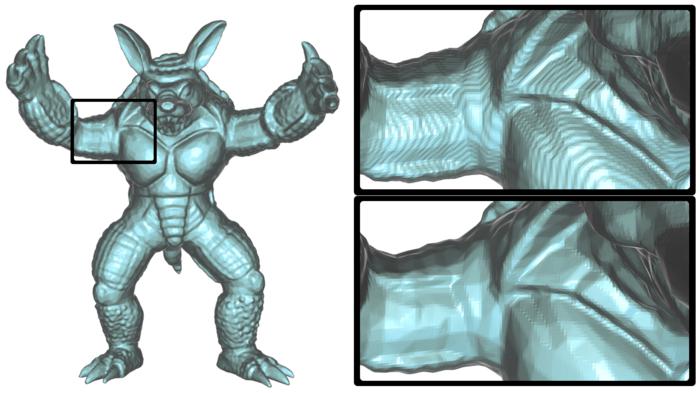
Contouring Discrete Indicator Functions
Discrete indicator functions are a special class of functions for which typical iso-surfacing methods produce poor results. We propose a new interpolant that does not generate the ridges that are generated by Marching Cubes on the same data.
 download preprint
download preprint
BibTeX
@article{Manson:2011:CDIF,
author = {Josiah Manson and
Jason Smith and
Scott Schaefer},
title = {Contouring Discrete Indicator Functions},
journal = {Computer Graphics Forum (Proceedings of Eurographics)},
year = {2011},
volume = {30},
number = {2},
pages = {385--393},
}
Abstract
We present a method for calculating the boundary of objects from Discrete Indicator Functions that store 2-material volume fractions with a high degree of accuracy. Although Marching Cubes and its derivatives are effective methods for calculating contours of functions sampled over discrete grids, these methods perform poorly when contouring non-smooth functions such as Discrete Indicator Functions. In particular, Marching Cubes will generate surfaces that exhibit aliasing and oscillations around the exact surface. We derive a simple solution to remove these problems by using a new function to calculate the positions of vertices along cell edges that is efficient, easy to implement, and does not require any optimization or iteration. Finally, we provide empirical evidence that the error introduced by our contouring method is significantly less than is introduced by Marching Cubes.
Supplemental
 contour_ours_fast.zip
contour_ours_fast.zip
3D contouring program that implements both our method and marching cubes.
 contour_indicator_eg2011.pptx
contour_indicator_eg2011.pptx
Slides of presentation given by Jason Smith during Eurographics 2011.
License
The images, executables, and code supplied are from the web page http://josiahmanson.com. These materials are free to use for non-commercial purposes. Any works that use materials from this web page should acknowledge Josiah Manson and the paper Contouring Discrete Indicator Functions. For commercial use, please contact Josiah Manson (josiahmanson@gmail.com).